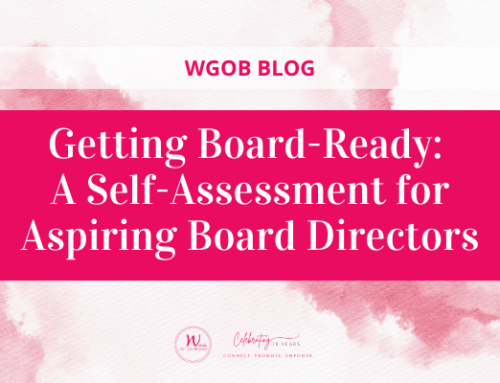In today’s environment, finding information and advice on board service isn’t difficult—but how much of it is true? Let us help by debunking five common myths you may encounter on your board journey.
1. You must be a CEO to obtain a seat on a board
While having CEO experience can help you obtain a seat on a corporate board, it is not a must-have requirement. Diversity of thought and background on a board is key, and board members are selected based on many attributes, including their experience, expertise, industry knowledge, leadership skills, reputation, integrity, network and professional connections.
Aspiring board members do not need to be current or former CEOs; many board members come from other areas, such as finance, law, academia, technology or entrepreneurship.
2. You need a background in finance to become a board member
A finance background can be advantageous for a board member, especially for audit committees or financial oversight roles. However, financial expertise is not a requirement for all board members (although financial intelligence is needed — download our WGOB E-Guide to Financial Intelligence in the Boardroom for more information).
Boards benefit from diverse skillsets and perspectives, and as a result, members are selected for their backgrounds in various areas, including legal, technology and innovation, EDI, operations, stakeholder engagement, ESG, and global business, as well as specific industries.
3. Women need nonprofit board experience to get on a corporate board
While nonprofit board experience can benefit women (or anyone) looking to join a corporate board, it is not a requirement. Nonprofit board experience can demonstrate governance skills, strategic thinking, and the ability to work collaboratively, all of which are valuable for corporate board roles. However, there are multiple pathways to joining a corporate board:
Industry Expertise: Deep knowledge of a specific industry can make you an attractive candidate for relevant boards.
Professional Experience: A resume that includes strong leadership roles, such as experience as a high-level executive or entrepreneurial success, can demonstrate the necessary experience and credibility.
Skillsets: Expertise in finance, technology, law, human resources, or marketing can be valuable, especially if the board has a gap in such areas.
Networking: Building connections and gaining sponsors already involved in board service can lead to opportunities.
Diversity and Inclusion: As companies continue to prioritize diversity, bringing unique perspectives and experiences can be a distinct advantage.
While nonprofit board experience can demonstrate your capabilities and readiness, it is considered part of a broader set of qualifications that can lead to a corporate board role.
4. You need a governance certification to get on a board
A governance certification is not a must-have to join a board, but it can provide benefits:
Demonstrates Knowledge: It shows that you understand corporate governance principles, board responsibilities, and regulatory requirements.
Offers Credibility: Adds to your credentials, making you a more attractive candidate to boards seeking knowledgeable members.
Gives a Competitive Edge: Certification can differentiate you from other candidates in a competitive selection process.
Download the WGOB E-Guide to Board Education and Development Programs for details on relevant certifications to consider.
5. Getting on a board is a short-term process and all about who you know
While networking and relationships can be essential to getting on board, the process is typically more complex. It may vary in duration from short-term to longer-term depending on various factors.
Being connected to the right people can lead to introductions that may not have been possible otherwise. Similarly, sponsorship from someone who knows you well will carry significant weight.
However, while your connections can indeed fast-track your journey, securing a board position generally involves a combination of networking, skillset alignment, strategic positioning, and, at times, patience.






